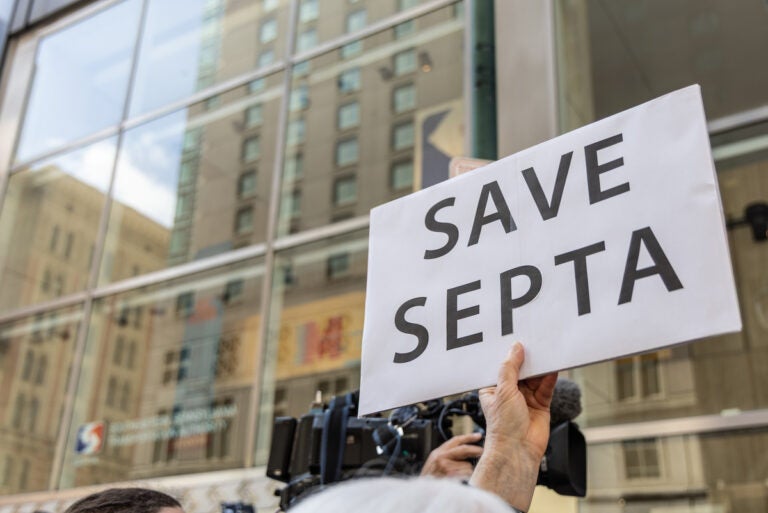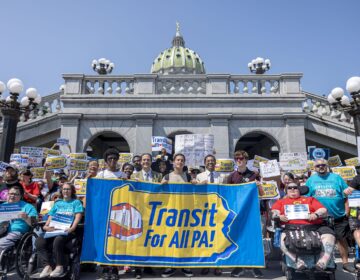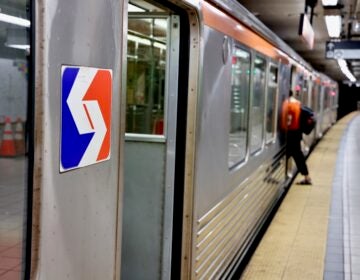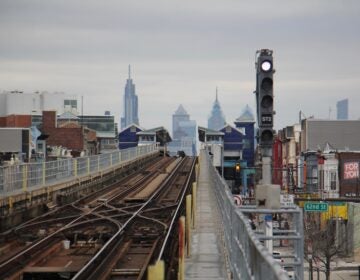SEPTA approves budget that could result in nearly half of its services being cut without state funding
Starting July 1, SEPTA faces a $213 million budget deficit, which will lead to cuts starting on Aug. 24.
Listen 1:15
Public transit supporters rallied for SEPTA outside their headquarters on Market Street on May 19, 2025. (Kimberly Paynter/WHYY)
From Philly and the Pa. suburbs to South Jersey and Delaware, what would you like WHYY News to cover? Let us know!
SEPTA’s board approved a budget for the upcoming fiscal year on Thursday that would result in cuts for 45% of its services and raised fares if the transit agency doesn’t receive its desired state funding.
Starting July 1, SEPTA faces a $213 million budget deficit. Left unaddressed, that will lead to cuts starting on Aug. 24. Bus, subway and Regional Rail services would all be impacted. Paratransit services on impacted lines would be eliminated, though SEPTA said it will provide some paratransit service consistent with federal guidelines.
SEPTA leaders were clear that the budget was not the one they wanted to put forth, but instead driven by the stalled funding negotiations in Harrisburg.
“These cuts are not a reflection of SEPTA’s values,” Vice Chair Marian Moskowitz said.
“Today’s vote on a balanced budget reflects a heartbreaking reality,” she added. “Without long-term sustainable funding from the state, we are forced to make decisions that no one at this table wants to make — decisions that will affect workers, students, seniors and families who rely on our buses, trolleys and trains every single day.”
Here’s a list of what SEPTA riders could lose out on in just over a month:
Aug. 24: 20% service cut
- 32 bus routes eliminated
- 16 bus routes shortened
- Service reductions on 88 bus, Metro and Regional Rail lines
- End of all special service, such as Sports Express
September 2025: 21.5% fare increase
- Complete hiring freeze, including operators
- Base fare increased to $2.90
Beginning Jan. 1, 2026: Additional 25% service cuts
- 5 Regional Rail routes eliminated
- 18 additional bus routes eliminated
- Broad-Ridge Spur [B3] eliminated
- Routes 10 [T1] and 15 [G1] trolleys converted to buses
- A 9 p.m. curfew on all remaining Metro and Regional Rail services
SEPTA leaders ‘remain hopeful’
Last week, the Pennsylvania House of Representatives passed Gov. Josh Shapiro’s $292 million proposal to fund mass transit across the Commonwealth. Current and former state leaders are calling on the Senate “to act quickly.” SEPTA Board Chair Kenneth Lawrence Jr. called the House vote “an important step” in securing critical funding.
“We remain hopeful that together we can adopt a solution that makes sense for taxpayers throughout our great Commonwealth and help us avoid massive disruptions for the workers, students, and families that rely on SEPTA every day,” Lawrence Jr. said.
Despite the looming service cuts, SEPTA General Manager Scott Sauer focused on the gains the agency has made since the pandemic, noting that year-over-year ridership increased 7% in May. Bus ridership on weekends has also increased by 11%, reaching the highest level of ridership in five years.
“What this tells us is that more and more people are choosing SEPTA,” Sauer said. “SEPTA’s long been known for its scrappiness, we consistently do more with less, and I’m confident with the funding resolution, we will be able to build on these successes.”
However, Sauer did address concerns about how the cuts could impact how many people use SEPTA going forward as people realize that as many as 50 bus routes could be slashed and “people anticipating something that may not materialize.”
“What we’re unsure of is how many people will react today and try to seek alternative transportation as opposed to waiting for cuts to actually happen,” Sauer said. “The closer we get to the beginning of the school year, parents and people are going to make plans for how they travel. We don’t want to mislead them that this might not happen, but we also don’t want them to run away from us today. Give us some time to see if we can work this out.”
During a press availability following the vote, Sauer said that if something develops between now and Aug. 24 regarding funding, the speed at which the agency can respond depends on how quickly the state legislature acts.
“Think of us like a big ship in the ocean, it takes us a minute to get turned around,” Sauer said. “There’s a lot of things we have to do for customers now to inform them of what’s coming. Bus stops have to be eliminated. Schedules have to be disseminated. We have to do a lot of communication. Everything from the destination sign on the bus to the app that directs people’s travel has to be adjusted to look like what the system looks like. And we’re going to spend the next seven weeks doing just that.”
The consequences of what SEPTA officials have warned is a potential “death spiral” would be serious. If all of the proposed cuts go through, one study reported that property values near SEPTA’s Regional Rail system could drop by $20 billion.
According to reporting by the WHYY News’ Climate Desk, the additional vehicle traffic that would result from the cuts could increase annual greenhouse gas emissions from Philadelphia’s transportation sector by about 4%, and the city’s overall carbon emissions by 1%.

Subscribe to PlanPhilly
WHYY is your source for fact-based, in-depth journalism and information. As a nonprofit organization, we rely on financial support from readers like you. Please give today.







